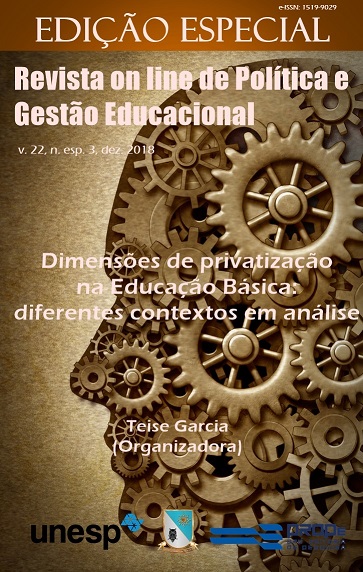The global partnership for education role in the education sectorial papers from lusophone africa
DOI:
https://doi.org/10.22633/rpge.v22iesp3.12010Keywords:
Lusophone Africa, Globalization, Educational policies.Abstract
Education is chosen as a priority by governmental and nongovernmental organizations because it is identified as a human right, but also as an important strategy to fight poverty and promote economic growth. In this context, the Global Partnership for Education is a new player who currently plays an important role in financing the education systems of the global South. To access to the Global Partnership for Education funds countries need to submit Education Sector Plans and meet a number of requirements.
Taking these assumptions into account, this article intends to infer to what extent the referents of globalization in education are present in the Education Sector Plans of Cape Verde, Guinea-Bissau, Mozambique and São Tomé and Principe, comparing differences and common points between them. Data collection was based on content analysis of a corpus of documents.
Downloads
References
BALL, S. J. Global education inc: new policy networks and the neo-liberal imaginary. Londres: Routledge, 169 p., 2012.
BANCO MUNDIAL. World Development Report 2018: Learning to Realize Education’s Promise. Washington: Banco Mundial, 240 p., 2018.
CARSON, T. R. Re-thinking Curriculum Change from the Place of the Teacher. In: ROPO, E. e AUTIO, T. (Org.). International conversations on curriculum studies: subject, society and curriculum. Roterdão: Sense Publishers, p. 213-224, 2009.
CROSSLEY, M. Cross-cultural issues, small states and research: capacity building in Belize. International Journal of Educational Development, v. 21, n. 3, p. 217-229, 2001.
DALE, R. Globalização e educação: demonstrando a existência de uma "Cultura Educacional Mundial Comum" ou localizando uma "Agenda Globalmente Estruturada para a Educação"? Educação & Sociedade, Campinas, v. 25, p. 423-460, 2004.
GEORGE, J.; LEWIS, T. Exploring the global/local boundary in education in developing countries: the case of the Caribbean. Compare: A Journal of Comparative and International Education, v. 41, n. 6, p. 721-734, 2011.
HARBER, C. Education and international development: theory, practice and issues. Oxford: Sympsium Books, 272 p., 2014.
HÄRMÄ, J. Is there a private schooling market in poor neighbourhoods in Maputo, Mozambique? Exploring the role of the non-state education sector. Oxford Review of Education, v. 42, n. 5, p. 511-527, 2016.
LEWIN, K. M. The Limits to Growth of Non-government Private Schooling in Sub-Saharan Africa. In: SRIVASTAVA, P. e WALFORD, G. (Org.). Private schooling in less economically developed countries: Asian and African perspectives. Oxford: Symposium Books, 41-63 p., 2007.
PACHECO, J. A. Whole, bright, deep with understanding: life story and politics of curriculum studies: in-between William Pinar and Ivor Goodson. Roterdão: Sense Publishers, 169 p., 2009.
ROBERTSON, S. L. Researching Global Education Policy: Angles In/Oun/Out... In: VERGER, A.;NOVELLI, M., et al. (Org.). Global education policy and international development: New agendas, issues and policies. Londres: Bloomsbury Academic, 33-51 p., 2012.
SRIVASTAVA, P. Low-fee Private Schooling: issues and evidence. In: SRIVASTAVA, P. (Org.). Low-fee private schooling: Aggravating equity or mediating disadvantage? Oxford: Symposium Books, 7-35p., 2013.
STEINER-KHAMSI, G. Understanding policy borrowing and lending. Building comparative policy studies. In: STEINER-KHAMSI, G. e WALDOW, F. (Org.). World yearbook of education 2012. Policy borrowing and lending in education. Londres: Routledge, 5-17 p., 2012.
VERGER, A.; FONTDEVILA, C.; ZANCAJO, A. The privatization of education: a political economy of global education reform. Nova York: Teachers College Press, 224 p., 2016.
VERGER, A.; NOVELLI, M.; ALTINYELKEN, H. K. Global education policy and international development: an introductory framework. In: VERGER, A.;NOVELLI, M., et al (Org.). Global education policy and international development: New agendas, issues and policies. Londres: Bloomsbury Academic, 3-31 p., 2012.
WALFORD, G.; SRIVASTAVA, P. Examining Private Schooling in Less Economically Developed Countries: Key issues and new evidence. In: SRIVASTAVA, P. e WALFORD, G. (Org.). Private Schooling in Less Economically Developed Countries: Asian and African perspectives. Oxford: Symposium Books, 7-14 p., 2007.
WILLIAMS, L. Globalisation of Education Policy: Its Effects on Developing Countries. In: ZAJDA, J. e RUST, V. (Org.). Globalisation, policy and comparative research. Discourses of globalization: Springer Netherlands, 77-92 p., 2009.












